In the autumn of 1862 (after the Emancipation Proclamation was issued on September 22, and before it took effect on January 1, 1863), two Covenanter (Reformed Presbyterian Church of North America) ministers met privately with President Abraham Lincoln to discuss some particular priority goals that they wished the Lincoln administration to achieve. The Oval Office has rarely heard such a speech reminiscent of Psalm 2.
We visit you, Mr. President, as the representatives of the Reformed Presbyterian, or, as it is frequently termed, "Scotch Covenanter," Church, — a Church whose sacrifices and sufferings in the cause of civil and religious liberty are a part of the world's history, and to which we are indebted, no less than to the Puritans, for those inestimable privileges so largely enjoyed in the free States of this Union, and which, true to its high lineage and ancient spirit, does not hold within its pale a single Secessionist, or sympathizer with rebellion, in these United States.
Our Church has unanimously declared, by the voice of her highest court, that the world has never seen a conflict in which right was more clearly wholly upon the one side, and wrong upon the other, than in the present struggle of this Government with this slaveholders' rebellion. She has also unanimously declared her determination to assist the Government by all lawful means in her power in its conflict with this atrocious conspiracy, until it be utterly overthrown and annihilated.
Profoundly impressed with the immense importance of the issues involved in this contest, and with the solemn responsibilities which rest upon the Chief Magistrate in this time of the nation's peril, our brethren have commissioned us to come and address you words of sympathy and encouragement, also to express to you views which, in their judgment, have an important bearing upon the present condition of affairs in our beloved country; to congratulate you on what has already been accomplished in crushing rebellion, and to exhort you to persevere in the work, until it has been finally completed.
Entertaining no shadow of doubt as to the entire justice of the cause in which the nation is embarked, we nevertheless consider the war a just judgment of Almighty God for the sin of rejecting his authority, and enslaving our fellow-men, and are firmly persuaded that his wrath will not be appeased, and that no permanent peace will be attained, until his authority be recognized, and the abomination that maketh desolate utterly extirpated.
As an anti-slavery church of the most radical school, believing slavery to be a heinous and aggravated sin both against God and man, and to be placed in the same category with piracy, murder, adultery, and theft, it is our solemn conviction that God by his Word and Providence is calling the nation to immediate, unconditional, and universal emancipation. We hear his voice in these thunders of war saying to us, "Let my people go." Nevertheless, we have hailed with delighted satisfaction the several steps which you have taken in the direction of emancipation. Especially do we rejoice in your late proclamation, declaring your purpose to free the slaves in the rebel States on the first day of January, 1863, an act which, when carried out, will give the death-blow to rebellion, strike the fetters from millions of bondmen, and will secure for its author a place high among the wisest of rulers and the noblest benefactors of the race. Permit us, then, Mr. President, most respectfully yet most earnestly, to urge upon you the importance of enforcing that proclamation to the utmost extent of that power with which you are vested. Let it be placed on the highest grounds of Christian justice and philanthropy; let it be declared to be an act of national repentance for long complicity with the guilt of slavery. Permit nothing to tarnish the glory of the act, or rob it of its sublime moral significance and grandeur, and it cannot fail to meet a hearty response in the conscience of the nation, and to secure infinite blessings to our distracted country. Let not the declaration of the immortal Burke in this instance be verified: "Good works are commonly left in a rude and imperfect state through the tame circumspection with which a timid prudence so frequently enervates beneficence. In doing good we are cold, languid, and sluggish, and of all things afraid of being too much in the right." We urge you by every consideration drawn from the Word of God and the present condition of our bleeding country, not to be moved from the path of duty, on which you have so auspiciously entered, either by the threats or blandishments of the enemies of human progress, nor to permit this great act to lose its power through the fears of its timid friends.
There is another point which we esteem of prominent importance, and to which we wish briefly to call your attention. The Constitution of the United States contains no acknowledgment of the authority of God, of his Christ, or of his law as contained in the Holy Scriptures. This we deeply deplore, as wholly inconsistent with all claim to be considered a Christian nation, or to enjoy the protection and favor of God. The Lord Jesus Christ is above all earthly rulers. He is King of kings, and Lord of lords. He is the one Mediator between God and man, through whom alone either nations or individuals can secure the favor of the Most High God, who is saying to us in these judgments, "Be wise now, therefore, O ye kings! be instructed, O ye judges of the earth! serve the Lord with fear. Kiss the Son, lest he be angry, and ye perish from the way, when his wrath is kindled but a little. Blessed are all they that trust in him. For the nation and kingdom that will not serve thee shall perish; yea, those nations shall be utterly wasted."
This time appears to us most opportune for calling the nation to a recognition of the name and authority of God, to the claims of him who will overturn, overturn, and overturn, until the kingdoms of this world become the kingdoms of our Lord and of his Christ. We indulge the hope, Mr. President, that you have been called, with your ardent love of liberty, your profound moral convictions manifested in your sabbath proclamation, and in your frequent declarations of dependence upon Divine Providence, to your present position of honor and influence, to free our beloved country from the curse of slavery, and secure for it the favor of the great Ruler of the universe. Shall we not now set the world an example of a Christian State governed, not by the principles of mere political expediency, but acting under a sense of accountability to God, and in obedience to those laws of immutable morality which are binding alike upon nations and individuals?
We pray that you may be directed in your responsible position by divine wisdom, that God may throw over you the shield of his protection, that we may soon see rebellion crushed, its cause removed, and our land become Immanuel's land.






















